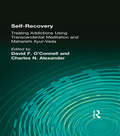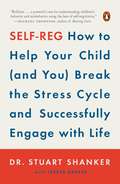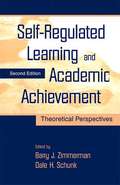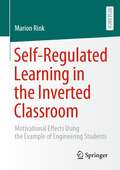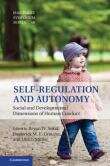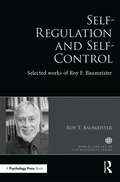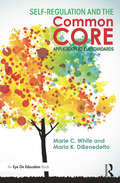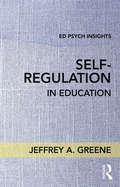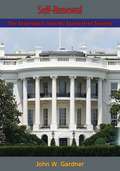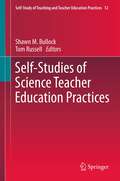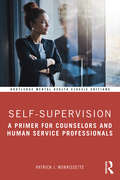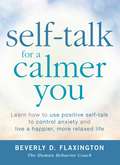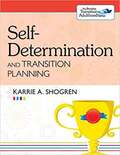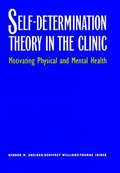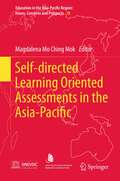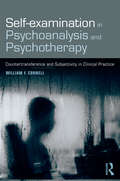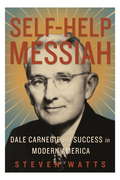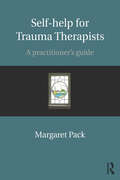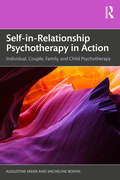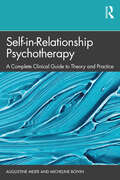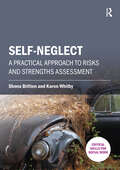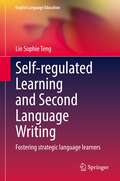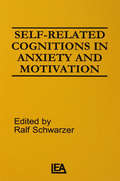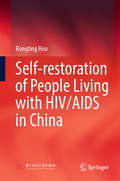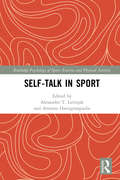- Table View
- List View
Self-Recovery: Treating Addictions Using Transcendental Meditation and Maharishi Ayur-Veda
by David F O'Connell Charles N AlexanderA valuable resource for addressing/promoting the spiritual awakening/development for patients based on a thoroughly researched system of meditationNearly 40% of americans saw an alternative healthcare practitioner last year. Interest in Yoga-an aspect of ayurveda-is growing nationally and is starting to become part of more progressive treatment programs. Patients want more. Providers need to offer more. And choices need to be based on sciencetific research on complementary/alternative medicine, which is under-researched in the addictions treatment field right now. Their has been a flurry of interest in Trancendental Meditation (TM) the past few months, mostly due to very impressive research on lowering blood pressure-especially in African Americans. This groundbreaking, scientifically based book shows how TM can have profound health-promoting effects on addictions as well, according to recent research on profound brain changes caused by TM practice.Self-Recovery acquaints readers with the use of Transcendental Meditation program and Maharishi Ayur-Veda. This natural comprehensive approach to health care, as brought to light from the ancient Vedic tradition of India by Maharishi Mahesh Yogi, allows individuals to break negative habits that arise from an incomplete understanding of the relationship between mind, body, and environment. Self-Recovery shows how this ancient system of mind-body medicine, through its mental and physical procedures, can be used to treat addictive diseases effectively.The first book written on the application of the Transcendental Meditation (TM) program and Maharishi Ayur-Veda to addictions treatment, this volume is interdisciplinary in scope with original chapters by psychologists, physicians, physiologists, neurochemists, and other addictions professionals who offer an alternative paradigm to understanding and treating addictions. In contrast to conventional treatments, the TM program and Maharishi Ayur-Veda appear to provide a natural, comprehensive treatment approach that profoundly influences all levels of individual life that can impact on the addictive process. Not overly technical, Self-Recovery shares the pioneering experiences of clinicians using these holistic procedures as well as the striking findings of researchers who have integrated them into current chemical dependency treatments. For readers without prior introduction to this new approach, the TM program and Maharishi Ayur-Veda are briefly but thoroughly described. Readers looking for an effective mind-body treatment of addictions that is holistic in nature will find it in this book as it introduces them to this very ancient, but quite relevant, system of healing that can act in a complementary fashion with modern psychological and medical approaches to addictive disorders. Practitioners will find a description of Maharishi Ayur-Veda programs and learn about incorporating them into daily practice. Psychotherapists will learn how this unique program can affect the recovery process from addictive diseases. Through rich presentations of theory, research, and clinical case studies, Self-Recovery makes knowledge of Maharishi Ayur-Veda and the addictions come alive. The book is divided into four sections, the first of which contains an examination of the theoretical underpinnings and existing research on the TM program and its applications to addictions treatment. The second section features original research on the impact of TM on severe alcoholism and nicotine addiction. In section three, clinicians share case studies on the impact of the TM program on personal growth experienced during recovery from alcohol and other drug addictions. Section four presents theory and clinical application of the twenty approaches of Maharishi Ayur-Veda in chemical dependency treatment. A vital source of information on addictions treatment, this book is essential rea
Self-Reg: How to Help Your Child (and You) Break the Stress Cycle and Successfully Engage with Life
by Stuart ShankerThere's no such thing as a bad kid. That's what a lifetime of experience has taught Dr. Stuart Shanker. No matter how difficult, out of control, distracted, or exhausted a child might seem, there's a way forward: self-regulation. Overturning decades of conventional wisdom, this radical new technique allows children and the adults who care for them to regain their composure and peace of mind. Self-Reg is a groundbreaking book that presents an entirely new understanding of your child's emotions and behavior and a practical guide for parents to help their kids engage calmly and successfully in learning and life. Grounded in decades of research and working with children and parents by leading child psychologist Dr. Shanker, Self-Reg realigns the power of the parent-child relationship for positive change. Self-regulation is the nervous system's way of responding to stress. We are seeing a generation of children and teens with excessively high levels of stress, and, as a result, an explosion of emotional, social, learning, behavior, and physical health problems. But few parents recognize the "hidden stressors" that their children are struggling with: physiological as well as social and emotional. An entrenched view of child rearing sees our children as lacking self-control or willpower, but the real basis for these problems lies in excessive stress. Self-regulation can dramatically improve a child's mood, attention, and concentration. It can help children to feel empathy, and to cultivate the sorts of virtues that most parents know are vital for their child's long-term wellbeing. Self-regulation brings about profound and lasting transformation that continues throughout life. Dr. Shanker translates decades of his findings from working with children into practical, prescriptive advice for parents, giving them concrete ways to develop their self-regulation skills and teach their children to do the same and engage successfully with life for optimal learning, social, and emotional growth.From the Hardcover edition.
Self-Regulated Learning and Academic Achievement: Theoretical Perspectives
by Barry J. Zimmerman Dale H. SchunkThis volume brings together internationally known researchers representing different theoretical perspectives on students' self-regulation of learning. Diverse theories on how students become self-regulated learners are compared in terms of their conceptual origins, scientific form, research productivity, and pedagogical effectiveness. This is the only comprehensive comparison of diverse classical theories of self-regulated learning in print. The first edition of this text, published in 1989, presented descriptions of such differing perspectives as operant, phenomenological, social learning, volitional, Vygotskian, and constructivist theories. In this new edition, the same prominent editors and authors reassess these classic models in light of a decade of very productive research. In addition, an information processing perspective is included, reflecting its growing prominence. Self-regulation models have proven especially appealing to teachers, coaches, and tutors looking for specific recommendations regarding how students activate, alter, and sustain their learning practices. Techniques for enhancing these processes have been studied with considerable success in tutoring sessions, computer learning programs, coaching sessions, and self-directed practice sessions. The results of these applications are discussed in this new edition. The introductory chapter presents a historical overview of research and a theoretical framework for comparing and contrasting the theories described in the following chapters, all of which follow a common organizational format. This parallel format enables the book to function like an authored textbook rather than a typical edited volume. The final chapter offers an historical assessment of changes in theory and trends for future research. This volume is especially relevant for students and professionals in educational psychology, school psychology, guidance and counseling, developmental psychology, child and family development, as well as for students in general teacher education.
Self-Regulated Learning in the Inverted Classroom: Motivational Effects Using the Example of Engineering Students
by Marion RinkThe Inverted Classroom is a blended learning scenario that consists of two phases: In the Online Phase the learners acquire learning content using interactive learning materials, primarily videos, provided by the teacher online. In a second stage, there is an Attendance Phase at the higher education institution with the purpose of learners processing, practising and deepening their understanding of what they have already learnt in a class with other stakeholders. Based on the Self-Determination Theory of Richard M. Ryan and Edward L. Deci, this qualitative study examines how learning in the Inverted Classroom affects the basic psychological needs of autonomy, competence and relatedness of higher education engineering students. A central aspect is the promotion of the students' intrinsic learning motivation through support measures and appropriate didactical design.
Self-Regulation and Autonomy
by Ulrich Müller Bryan W. Sokol Frederick M. E. Grouzet Bryan W. Sokol Frederick M. E. GrouzetSelf-regulation and autonomy have emerged as key predictors of health and well-being in several areas of psychology. This timely volume brings together eminent scholars at the forefront of this research, which is taking place in disciplines including developmental psychology, developmental neuroscience, social psychology and educational psychology. The contributors present ideas and research findings on the development of self-regulation and autonomy, including their biological bases, antecedents and consequences. Editors Bryan W. Sokol, Frederick M. E. Grouzet and Ulrich Müller have shaped the volume's multidisciplinary perspective on self-regulation and autonomy to reflect the legacy of Jean Piaget, the trailblazing developmental psychologist whose work drew on a diverse body of research.
Self-Regulation and Self-Control: Selected works of Roy F. Baumeister (World Library of Psychologists)
by Roy BaumeisterIn the World Library of Psychologists series, international experts present career-long collections of what they judge to be their finest pieces—extracts from books, key articles, salient research findings, and their major practical theoretical contributions. In this volume, Roy F. Baumeister reflects on his distinguished career as an eminent scholar in the field of self-control and self-regulation, as well as belonging, rejection, free will, and consciousness. Offering a unique perspective on both the program of research in ego-depletion as one of social psychology’s most widely successful theories, and its position in the changing landscape of the scientific field, the book charts Baumeister’s development as one of the pioneers of study into self-control. Featuring a newly written introductory piece in which the author offers a unique insight into the initial findings that led to an eventual theory of ego-depletion, this collection will give readers a vital understanding of how the hugely influential theory of ego depletion first came to be developed, and is essential reading for students and researchers in self-control and self-regulation.
Self-Regulation and the Common Core: Application to ELA Standards
by Marie C. White Maria K. DiBenedettoThe Common Core State Standards for English Language Arts created new challenges for teachers and pre-service instructors. Self-regulated learning, using one’s thoughts, feelings, and behaviors to reach goals, can help students become independent, self-directed learners. This book provides educators the support they need to apply the principles of self-regulated learning in their teaching for success with the Common Core. In this book, Marie C. White and Maria K. DiBenedetto present information on how to apply academic self-regulation by integrating two models: one which addresses how students develop self-regulatory competence, the other which focuses on the various processes within the three phases of self-regulated learning. In addition, Self-Regulation and the Common Core provides specific lesson plans for grades K-12, using the standards and the integrated framework to promote higher order thinking and problem-solving activities.
Self-Regulation in Education (Ed Psych Insights)
by Jeffrey A. GreeneSelf-regulation in education is a familiar and important topic for all educators: professors, administrators, teachers, researchers, journalists, and scholars. As educational standards require that students take control of what and how they learn, self-regulation skills are essential to student success. Written by a leading expert on self-regulation and self-regulated learning, this book situates the topic within the broader context of educational psychology research and theory, bringing it to a wider audience. With chapters on the fundamentals of self-regulation, explanations of its uses, and advice for best application, this concise volume is designed for any education course that includes self-regulation in the curriculum. It will be indispensable for education researchers and both pre- and in-service teachers alike. Jeffrey A. Greene is Associate Professor in the Learning Sciences and Psychological Studies program in the School of Education at the University of North Carolina at Chapel Hill, USA.
Self-Renewal: The Individual and the Innovative Society [First Edition]
by John W. Gardner“The only stability possible is stability in motion.”—John William GardnerIn his classic treatise Self-Renewal, John W. Gardner examines why great societies thrive and die. He argues that it is dynamism, not decay, that is dramatically altering the landscape of American society. The twentieth century has brought about change more rapidly than any previous era, and with that came advancements, challenges, and often destruction. Gardner cautions that “a society must court the kinds of change that will enrich and strengthen it, rather than the kind of change that will fragment and destroy it.”A society’s ability to renew itself hinges upon its individuals. Gardner reasons that it is the waning of the heart and spirit—not a lack of material might—that threatens American society. Young countries, businesses, and humans have several key commonalities: they are flexible, eager, open, curious, unafraid, and willing to take risks. These conditions lead to success. However, as time passes, so too comes complacency, apathy, and rigidity, causing motivation to plummet. It is at this junction that great civilizations fall, businesses go bankrupt, and life stagnates. Gardner asserts that the individual’s role in social renewal requires each person to face and look beyond imminent threats.Ultimately, we need a vision that there is something worth saving. Through this vision, Gardner argues, society will begin to renew itself, not permanently, but past its average lifespan, and it will at once become enriched and rejuvenated.
Self-Studies of Science Teacher Education Practices
by Tom Russell Shawn M. BullockPart of a vital Springer series on self-study practices in teaching and teacher education, this collection offers a range of contributions to the topic that embody the reflections of science teacher educators who have applied self-study methodology to their own professional development. The material recognizes the paradox that lies between classroom science and the education of science teachers: the disciplines of science are often perceived as a quest for right answers, an unintentional by-product of the classroom focus on right answers in student assessment in science. In contrast, the profession of teaching has few right answers and frequently involves the management of conflicting tensions. A dilemma thus arises in science teacher education of how to shift perspectives among student teachers from reductionist to more inclusive attitudes that are open to the mercurial realities of teaching. The self-studies presented here are unique, fresh and stimulating. They include the input of a beginning science teacher as well as science teacher educators from a range of backgrounds and varying levels of experience. In addition, the volume presents a truly international perspective on the issues, with authors hailing from five countries. Providing analysis at the leading edge of education theory, this collection will make fascinating reading for those teaching science--as well as those teaching science teachers.
Self-Supervision: A Primer for Counselors and Human Service Professionals (Routledge Mental Health Classic Editions)
by Patrick J. MorrissetteSelf-Supervision synthesizes the literature on the theory and practice of self-supervision and provides counselors and human service professionals with a plan for the pursuit of independent professional growth. The classic edition includes a new preface from the author reflecting on his work and on the changes in society and the field since the book’s initial publication. In these chapters, professionals will find cost-effective and efficient strategies for developing their skills while still ensuring that they’re providing quality treatment. They’ll also find a diverse array of strategies for self-supervision and a thoughtful discussion of reflective processes required to effectively evaluate one’s own practices.
Self-Talk for a Calmer You: Learn how to use positive self-talk to control anxiety and live a happier, more relaxed life
by Beverly FlaxingtonPowerful techniques for managing your anxiety!Every day, millions of people struggle with anxious thoughts and feelings of dread, but you don't have to be one of them. With Self-Talk for a Calmer You, you can change the way you approach your worries and finally break free from the tight grip of anxiety. Filled with practical advice and positive self-talk scripts, this empowering guide provides a variety of strategies for dealing with uneasy thoughts in a constructive manner and moving past detrimental hangups. Complete with quick assessments that reveal anxiety triggers, you'll also learn how to create a self-talk plan that fits your needs.From the workplace to personal relationships, Self-Talk for a Calmer You gives you the tools and confidence to develop a healthier way of thinking, overcome stressful situations, and reclaim your life.
Self-determination And Transition Planning, The Brookes Transition To Adulthood Series
by Karrie A. ShogrenSelf-determination has a powerful positive impact on post-school outcomes for young adults with disabilities—but how can educators teach students the skills they need to make their own choices and achieve their goals as they enter adulthood? This empowering guidebook shows the way. Packed with practical, research-validated guidance on explicitly teaching self-determination skills , this book helps educators support students in communicating their interests and needs, setting and reaching goals, and managing their own lives. Ready-to-use worksheets and activities will help students take an active role in their transition planning, and true case stories highlight the benefits of self-determination instruction: smoother transitions, improved behavior, and fulfilling lives beyond the classroom.
Self-determination Theory in the Clinic: Motivating Physical and Mental Health
by Kennon M. Sheldon Thomas E. Joiner Geoffrey WilliamsThe authors report on the state of the art regarding an exciting and important theory of human motivation: self-determination theory. This comprehensive theory has been under development for more than thirty years, and its postulates have received voluminous empirical support, derived from the best scientific methodologies (see Deci and Ryan 1985, 1991, 2000). The theory has finally achieved mainstream status within contemporary motivational theory and research.
Self-directed Learning Oriented Assessments in the Asia-Pacific
by Magdalena Mo MokThe Asia-Pacific region needs to maximize the benefits of education to enable it to compete in an economic future dominated by innovation, in which assessing student progress must be an empowering rather than delimiting factor. This detailed exposition of the theoretical basis and application tools of self-directed learning-oriented assessment (SLOA) reflects the very latest research championed by the Assessment Research Centre at The Hong Kong Institute of Education. Featuring a range of relevant case studies, it explores the varied theoretical issues related to SLOA and offers an integrated view of the system fully in line with the constructivist paradigm of learning which advocates formative rather than summative assessment. Many of the initiatives outlined here are firsts in the region. SLOA is already being applied in many schools with links to the ARC. It is an approach to assessment that acknowledges the centrality of self-directed learning and which positions assessment as a tool to enable and enhance self-directed learning. It draws on several theories of learning and assessment, including the constructivist notion that learning is best achieved when students take ownership of their educational process, setting their own goals and monitoring their own progress towards those goals. SLOA has been the research and service approach of the ARC since 2005. In the intervening years the centre has developed a number of tools to facilitate SLOA learning and assessment, including vertical ability scales, teacher-friendly computer software and packages for self-directed learning.
Self-examination in Psychoanalysis and Psychotherapy: Countertransference and Subjectivity in Clinical Practice
by William F. CornellSelf-examination in Psychoanalysis and Psychotherapy provides open and intimate accounts of the experience of being in psychotherapy. The internal life of the therapist is as much at the heart of the stories told as those of the clients. William F. Cornell here writes in a more personal and literary voice, avoiding as much as possible, the dense theoretical language that often typifies analytic writing. Central to the thesis elaborated in this book is that of how the therapist’s own personal history and unconscious motivations can deepen or distort the therapist’s understanding of the client. One chapter is devoted to the frank discussion of the author’s work with a client that was not only unhelpful but in fact harmful. Cornell emphasizes the capacity to call one’s self into question as a fundamental outcome of psychotherapy and psychoanalysis. Attention is paid to the conscious and unconscious forces that create profound dynamic tensions between the enlivening desire for a fuller life and the defenses that deaden one’s capacity to think and to engage more fully in one’s life and relationships. The dynamics of transgenerational transmission of grief, loss, and trauma are also examined closely. The psychotherapist as person and professional, rather than the clients, is at the heart of this book. Self-examination in Psychoanalysis and Psychotherapy will appeal to all psychoanalysts and psychoanalytic psychotherapists who will find an exceptionally open discussion of the challenges, learning, and meanings of being a psychotherapist.
Self-help Messiah
by Steven WattsAn illuminating biography of the man who taught Americans "how to win friends and influence people" Before Stephen Covey, Oprah Winfrey, and Malcolm Gladwell there was Dale Carnegie. His book, How to Win Friends and Influence People, became a best seller worldwide, and Life magazine named him one of "the most important Americans of the twentieth century." This is the first full-scale biography of this influential figure. Dale Carnegie was born in rural Missouri, his father a poor farmer, his mother a successful preacher. To make ends meet he tried his hand at various sales jobs, and his failure to convince his customers to buy what he had to offer eventually became the fuel behind his future glory. Carnegie quickly figured out that something was amiss in American education and in the ways businesspeople related to each other. What he discovered was as simple as it was profound: Understanding people's needs and desires is paramount in any successful enterprise. Carnegie conceived his book to help people learn to relate to one another and enrich their lives through effective communication. His success was extraordinary, so hungry was 1920s America for a little psychological insight that was easy to apply to everyday affairs. Self-help Messiah tells the story of Carnegie's personal journey and how it gave rise to the movement of self-help and personal reinvention.
Self-help for Trauma Therapists: A Practitioner's Guide
by Margaret PackFor those offering trauma-informed care, it can be difficult to maintain wellbeing and a balanced, positive outlook when the nature of their job requires frequent engagement with traumatic disclosures. Self-help for Trauma Therapists: A Practitioner’s Guide intends to assist human service workers- such as those working as therapists, social workers and counsellors- to maintain their self- care and professional effectiveness when working in fields where stress and trauma play a key factor in their everyday working lives. Adopting a comprehensive, multi-layered approach to self-care based, the book grounds its exploration of practice through researched accounts with experience professionals. Including accounts from clinical psychologists, therapists, counsellors, social workers and the friends and family of people in these professions, this book creates a narrative on stress and trauma from the human service worker perspective. Interwoven with these stories of practice, the author includes reflections on her own experiences in practice over the past 25 years with trauma survivors. With discussions on risk and resilience, compassion fatigue and vicarious traumatisation, readers are introduced to the theories and practical applications of developing a professional model for maintaining wellbeing and self-care in their work. Self-help for Trauma Therapists: A Practitioner’s Guide is the first book of its kind to be written solely for human service workers. It is essential reading for beginning and more advanced practitioners who are involved in working with trauma and recovery and will also be of interest to supporters of those working in the helping professions.
Self-in-Relationship Psychotherapy in Action: Individual, Couple, Family and Child Psychotherapy
by Micheline Boivin Augustine MeierThis book presents a comprehensive guide to applying Meier and Boivin's Self-in-Relationship Psychotherapy model to clinical work with individuals, couples, families and children.The central theme of the book is that the paradigm of affects, cognitive processes and behaviors that informs current psychotherapy approaches needs to be broadened to include core self, relational and physical intimacy needs as motivating factors in psychotherapy. Drawing on multiple influences including relational psychoanalysis, the authors illustrate how to work with core needs when providing therapy to children and adults. They establish that core needs are universal, and their realizations are essential for healthy living and argue that clients achieve the healthiest outcomes by finding a way to balance the self alongside their relations with others. The concept of core self, relational and physical intimacy needs is what binds all the chapters in this book and makes it unique among psychotherapy approaches.With a clear transtheoretical approach and rich clinical vignettes, this book is core reading for any psychotherapists, psychoanalyst, or practicing psychologists.
Self-in-Relationship Psychotherapy: A Complete Clinical Guide to Theory and Practice
by Micheline Boivin Augustine MeierIn this innovative book, the authors set out their theory of Self-in-Relationship Psychotherapy (SIRP), advocating for the integration of relational, self, and physical intimacy needs in the conceptualization and treatment of psychological problems, placing human needs at the center of treatment. This marks a shift in how psychological and relational problems are understood, currently being perceived in terms of affects, cognitive processes and behaviors. Using numerous illustrations from their own clinical practice, Meier and Boivin contend that this understanding overlooks the pivotal role that needs play in all aspects of peoples’ personal lives and relationships. Children, adolescents, and adults do not live primarily from feelings and thoughts, but from basic psychological and relational, needs such as wanting to be in a meaningful relationship, having the autonomy and freedom to make decisions about their lives, experiencing being competent, being regarded as a significant and important person, and experiencing emotional, intimate, and sensual and/or sexual connections. By taking such an approach this book stands out among other books on psychotherapy theories. Authored by two seasoned psychologists who have provided therapeutic services to children, adolescents, and adults for 40 years, this book comprises the foundational theory for practicing Self-in-Relationship Psychotherapy, making it of interest to graduate students, clinicians in training, and practicing psychologists, social workers, and psychotherapists alike.
Self-neglect: A Practical Approach to Risks and Strengths Assessment (Critical Skills for Social Work)
by Shona Britten Karen WhitbySelf-neglect covers a wide range of behaviours, from neglecting to care for one's personal hygiene and health to one's surroundings; this can include behaviours such as hoarding of objects and/or animals. As presentation of self-neglect cases vary greatly, assessment and support planning should be made on an individualised case by case basis.Self-neglect describes a Risks and Strengths assessment model which has been developed by practitioners as an aid to frontline workers across all sectors, as well as agencies holding responsibilities in Safeguarding Adults. It aims to support and structure the effective, timely and consistent assessment of risk in relation to key social and healthcare factors of self-neglect both on an individual case level and at a strategic level in contributing to community/locality needs analysis and reporting mechanisms; including annual Safeguarding Adults Board Reports.
Self-regulated Learning and Second Language Writing: Fostering strategic language learners (English Language Education #26)
by Lin Sophie TengThis monograph is to investigate practical applications and contributions of self-regulated learning (SRL) to second/foreign language (L2) writing from sociocognitive and sociocultural perspectives. It showcases a comprehensive and updated review of conceptual and methodological issues of SRL and the state-of-the-art research on its applications to L2 learning and teaching. This volume further elaborates the design and results of a large-scale project which conducts observational and intervention studies investigating SRL strategies in L2 writing. This book reveals that a cross-disciplinary understanding of SRL strategies plays a crucial role in advancing theoretical functions of SRL and in extending its applications to L2 education in general, and L2 writing in particular. This book makes significant contributions to developing and validating new conceptual frameworks and tools for evaluating multidimensional structures of SRL strategies and self-efficacy in L2 writing; elucidating the interplay of personal, behavioral, environmental and psychological factors with SRL strategies and writing performance; and presenting an effective self-regulation instructional model for nurturing L2 learners’ motivation and confidence to strategize, reflect and succeed in writing.Teng has established herself as one of the prominent scholars in the discussion of self-regulated learning strategies. Her contribution to the fields of L2 writing and strategic learning are undeniable. This monograph is an excellent showing of how her endeavors to bring established theories from educational psychology to applied writing research have progressed over a number of methodologically rigorous studies. It should be required reading for anyone with an interest in cultivating strategic writers not only in the Chinese context but worldwide. Nathan Thomas, UCL Institute of Education
Self-related Cognitions in Anxiety and Motivation
by Ralf SchwarzerResearch on anxiety and motivation has witnessed substantial progress in recent years in developing innovative perspectives and applying advanced psychometric tools. The most important contributions were made by cognitively oriented psychologists who have related the information processing view to anxiety and motivation. The organized knowledge about oneself and the storage, processing and retrieval of information concerned with one's attitude and behavior strongly influences the way people think, feel and act. Therefore, self-referent thoughts play a major role as a cognitive component in anxiety and motivation. It is the idea of this book to integrate different lines of thinking in the field of anxiety and motivation by relating both topics to self-focussed attention, self-concept and self-evaluation in achievement contexts as well as in social contexts.
Self-restoration of People Living with HIV/AIDS in China
by Rongting HouThis book adopts an approach based on relational psychoanalysis, developed in the USA in and since the 1990s and guided by the self-psychology championed by Kohut and the Post-Kohutians. How people infected with HIV/AIDS live their lives is a growing concern in China. The book, based on relational psychoanalysis, explores their self-restoration, and more specifically, how adopting an attitude of “dying to live” helps them face tremendous challenges in life. By interviewing selected individuals at a given organization, the author focuses on their life experiences and on corresponding interventional mechanisms. The book’s three most important features are as follows: 1) its application of self-psychology by Heinz Kohut into the context of psychological intervention; 2) a wealth of qualitative data gathered through in-depth interviews; and 3) the author’s self-reflection and analysis. The book offers a valuable guide for graduate students, researchers, and policymakers alike.By interviewing selected individuals at a given organization, the book focuses on the life histories of selected individuals after being diagnosed with AIDS (screening HIV positive) and on corresponding interventional mechanisms. Further, itemploys the self and self-object as key explanatory terms for the necessary psychotherapeutic interventions,and in order to create guidelines that sufficiently reflect the illness and corresponding interventions. Given its scope and focus, the book offers a valuable guide for graduate students, researchers, and policymakers alike.
Self-talk in Sport (Routledge Psychology of Sport, Exercise and Physical Activity)
by Alexander T. Latinjak Antonis HatzigeorgiadisAthletes are naturally exposed to significant psychological challenges in sports, but do not wait helplessly for the assistance of sports psychologists or trainers. Instead, they practise one form or another of self-regulation. Self-talk in Sport explores one such self-regulatory strategy: self-talk, the inner voice that accompanies every human being throughout their lives. Over time, research has revealed many secrets of self-talk in sport, though many others remain unveiled. This book offers you the opportunity to discover the multiple identities of our self-talk, how the “inner coach” serves as a rational counterpart to the irrational self, and what we need to do to develop our inner voice to reach its maximum self-regulatory potential. There is a general need for concrete interventions in sport, exercise, and performance psychology. In addition, the autonomous functioning of people is a central aim of psychological interventions that align with positive psychology and focus on people’s strengths rather than weaknesses. In this volume, researchers and applied practitioners are shown how they can use self-talk interventions to strengthen people’s rational self-regulation in order to deal with a variety of situations that apply to both sport and other exercise and performance contexts. Since self-talk is a tangible result of cognitive processes and inner experiences that researchers and applied practitioners can barely access, Self-talk in Sport is a tool for sports psychologists to understand and interact with hidden parts within athletes that have a major impact on sport and exercise experiences and performance. A book demonstrating the diverse – both rational and irrational identities – of self-talk, as well as specific interventions to change the inner dialogue of athletes, is a fundamental piece in the education of sport scientists.
